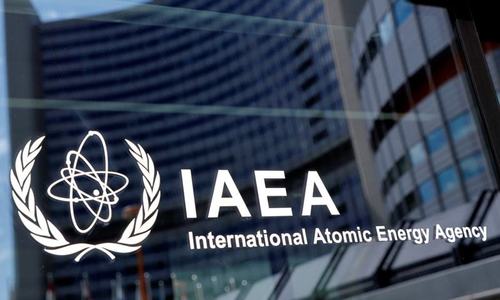VIENNA: The UN nuclear watchdog on Wednesday reported that Iran has again boosted its stock of highly enriched uranium, just days before talks are set to resume seeking to revive the 2015 nuclear deal.
In a report, the International Atomic Energy Agency (IAEA) estimated Iran’s stockpile of highly enriched uranium at 2,489.7 kilograms — many times in excess of the limit laid down in the 2015 agreement.
The total amount now includes 113.8 kg enriched to 20 percent, up from 84.3 kg in September, and 17.7 kg enriched up to 60 percent, up from 10 kg, the report said.
The document will be discussed during the IAEA’s Board of Governors, scheduled for next week with diplomats preparing to restart talks in Vienna on November 29 over reviving the moribund 2015 nuclear deal between Iran and world powers.
The remaining parties to the deal — Britain, China, France, Germany and Russia — will join the talks while the United States will participate indirectly.
Iran’s acting head of mission to UN agencies in Vienna, Mohammad Reza Ghaebi, said the new report “shows that the IAEA has continued its verification and surveillance activities regarding Tehran’s engagements.” Quoted by Iranian media, he said that talks were ongoing to “solve some issues between the two parties” and called on IAEA member states to refrain from “making hasty or politically motivated comments”.
A spokesman for Iran’s atomic agency told Fars news agency on Wednesday that IAEA chief Rafael Grossi would arrive in Tehran on Monday.
Grossi will meet Foreign Minister Hossein Amir-Abdollahian and Iranian Atomic Energy Organization chief Mohammad Eslami on Tuesday, the spokesman added.
On November 12, Grossi described as “astonishing” his lack of contact with the new Iranian government of President Ebrahim Raisi.
He said he had hoped to meet Iranian officials ahead of the next meeting of the IAEA’s Board of Governors, scheduled for next week.
During Grossi’s last visit to Tehran in September, he clinched a deal on access to monitoring equipment at Iran’s nuclear facilities.
But days later, the IAEA complained that it was prevented from “indispensable” access to a unit at the TESA complex in the city of Karaj, near Tehran, in violation of the September deal.
Iran’s ambassador to the IAEA rejected the charge, however, tweeting that “equipment related to this complex are not included for servicing”, referring to IAEA work on its monitoring equipment.
The IAEA on Wednesday also “categorically” denied its cameras had played a part in an unclaimed June attack on the TESA complex.
Tehran — which has blamed its arch-enemy Israel — told the agency it was investigating the possibility, the IAEA said in its report.
The agreement that Grossi reached in September was an extension of a deal struck in February after Iran limited some of the IAEA’s activities in the country.
Wednesday’s report warned, however, that the repeated prolongation of the agreement was “becoming a significant challenge to the Agency’s ability to restore... continuity of knowledge” about Iran’s nuclear activities. It warned that establishing clarity on activities in Karaj “has been widely recognised as essential in relation to a return to the JCPOA”, referring to the 2015 nuclear deal.
Published in Dawn, November 18th, 2021















































